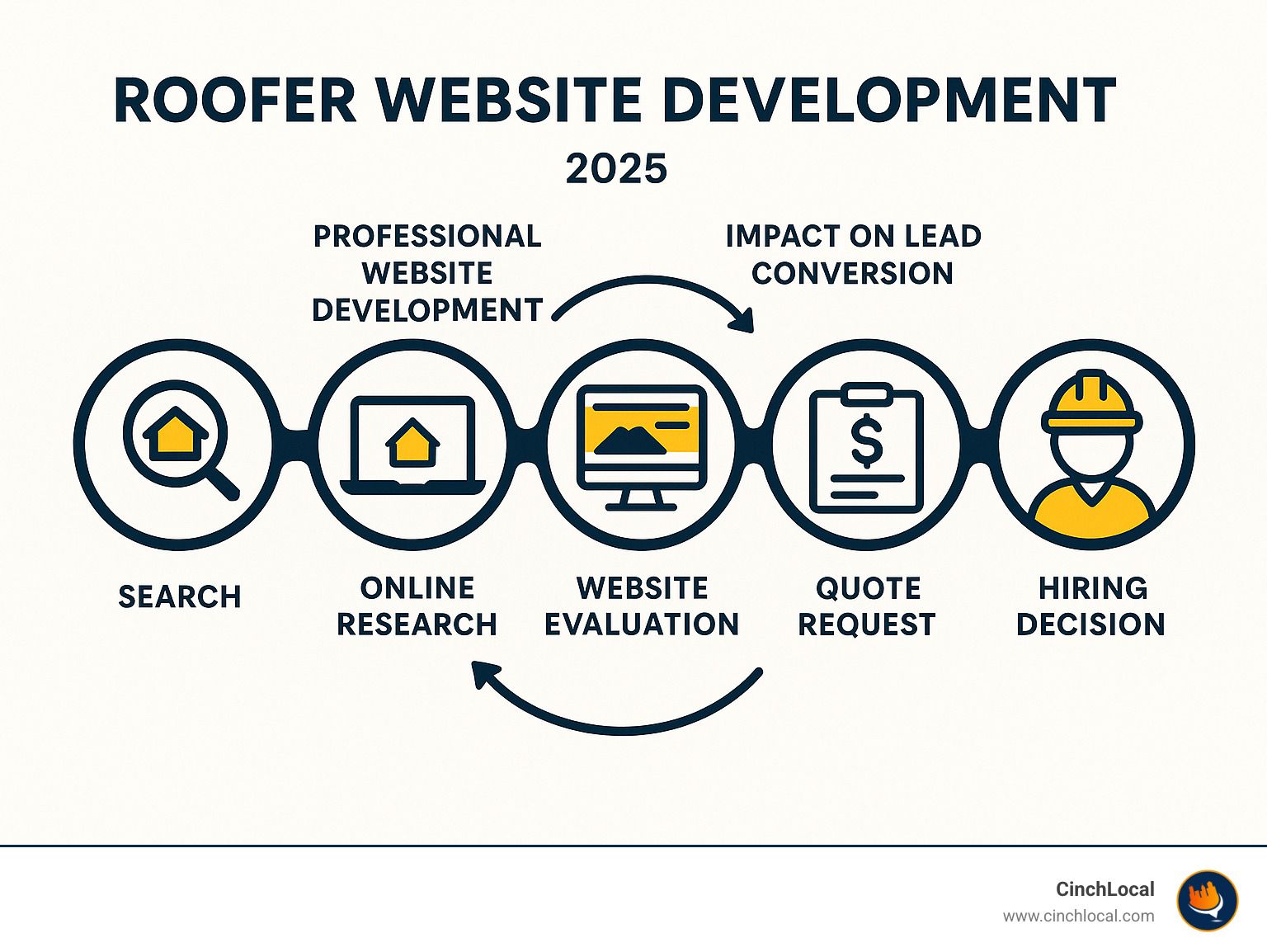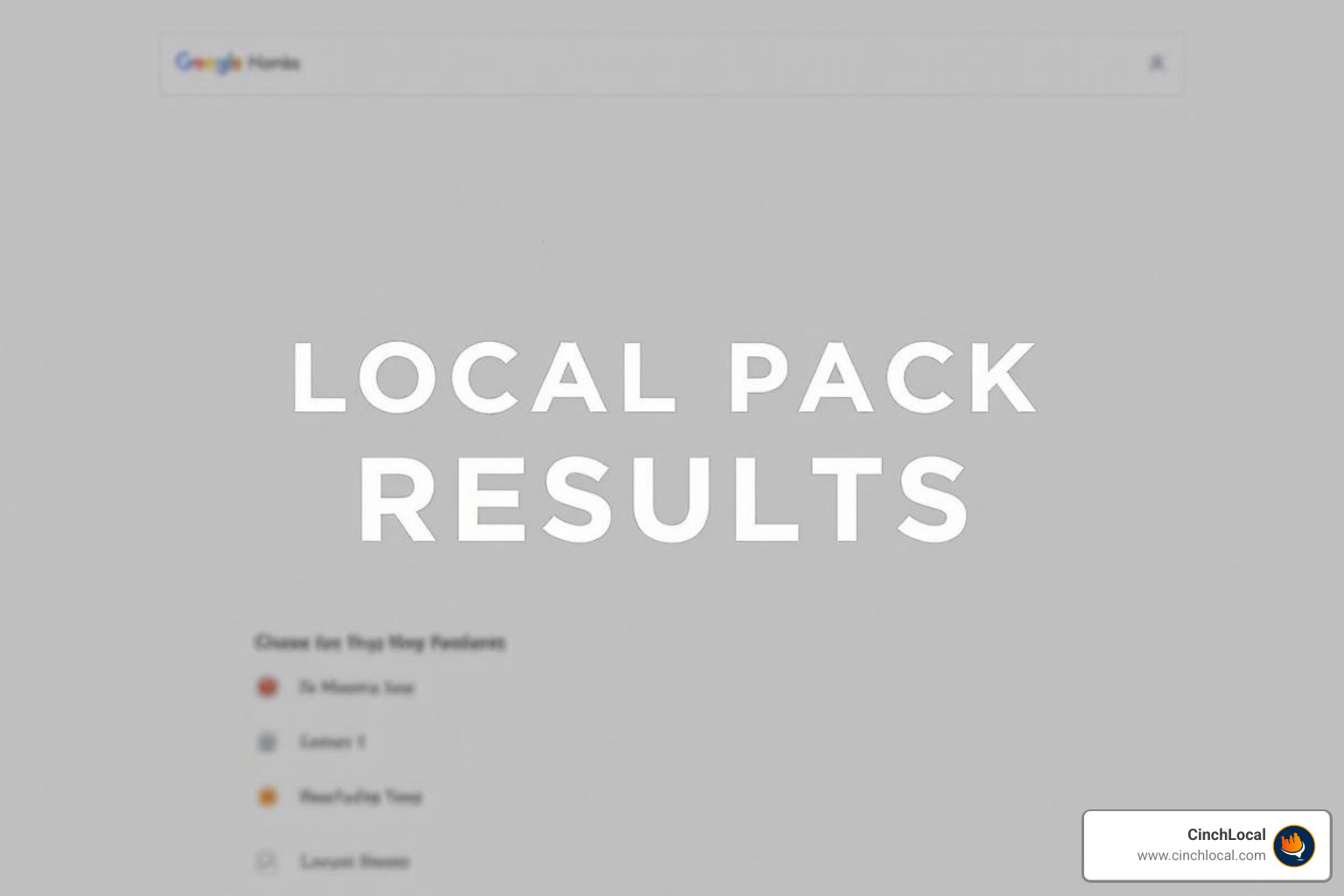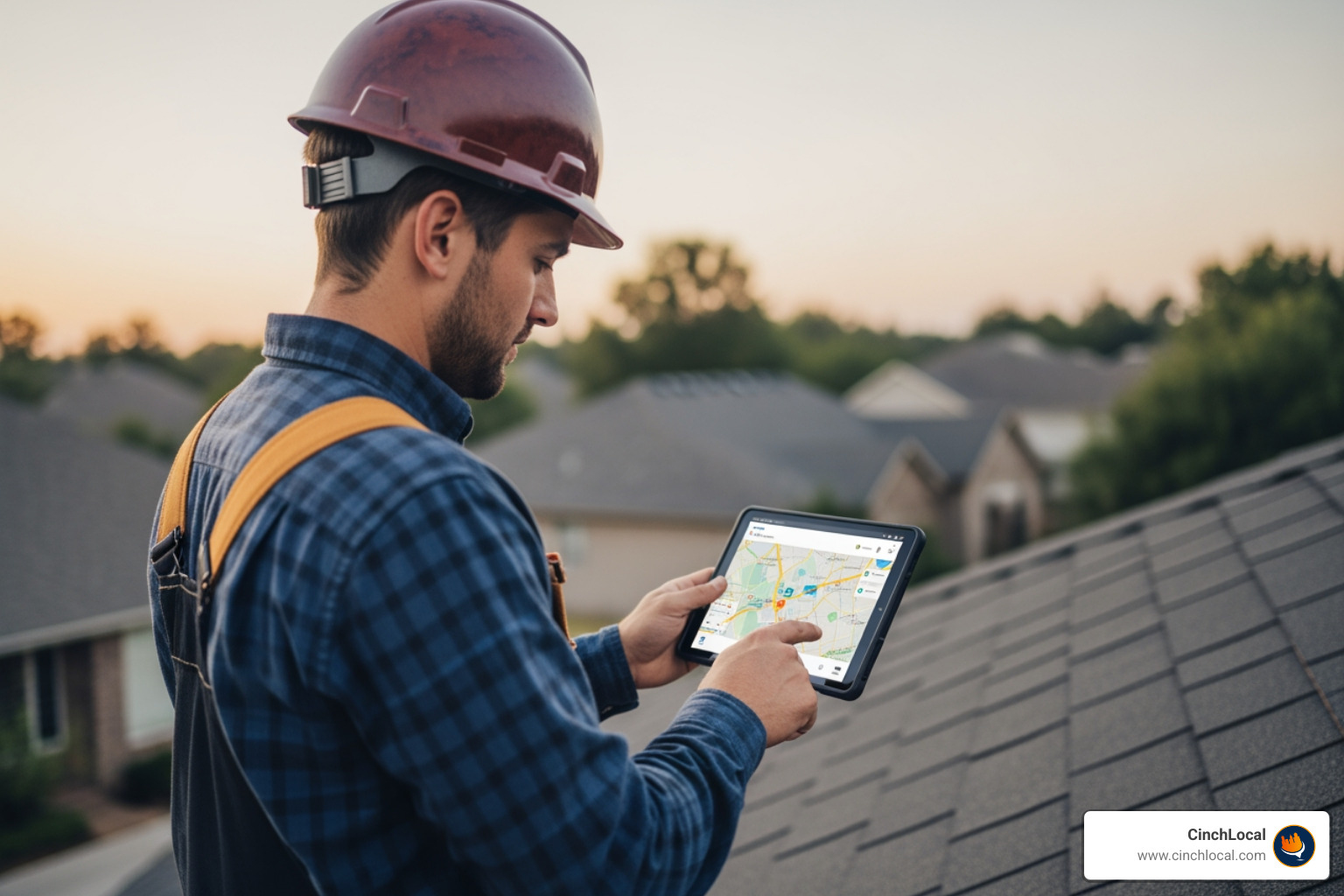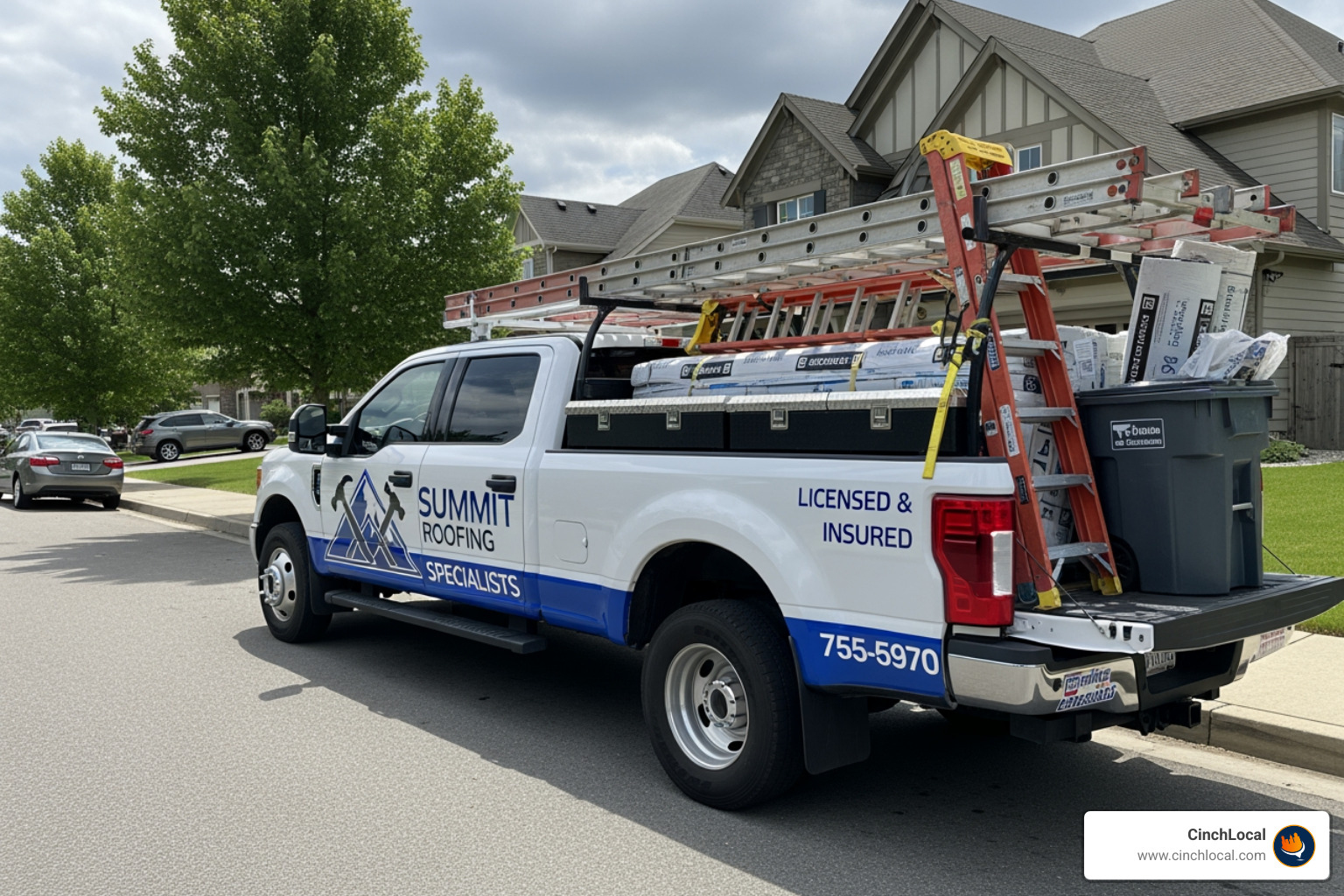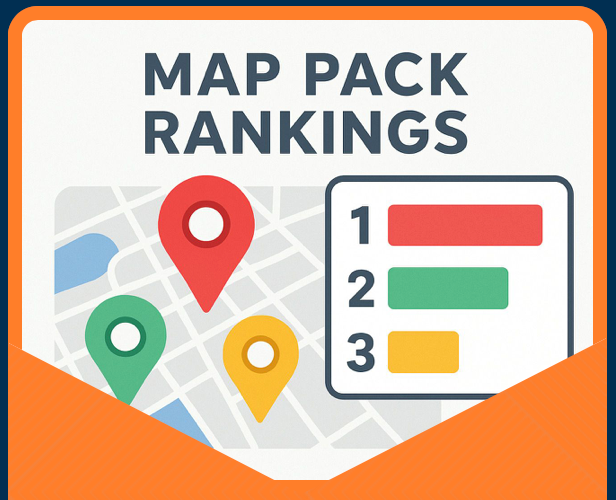
Cary Byrd // Founder of CinchLocal
Build It Right – Best Roofer Website Development Agencies Reviewed
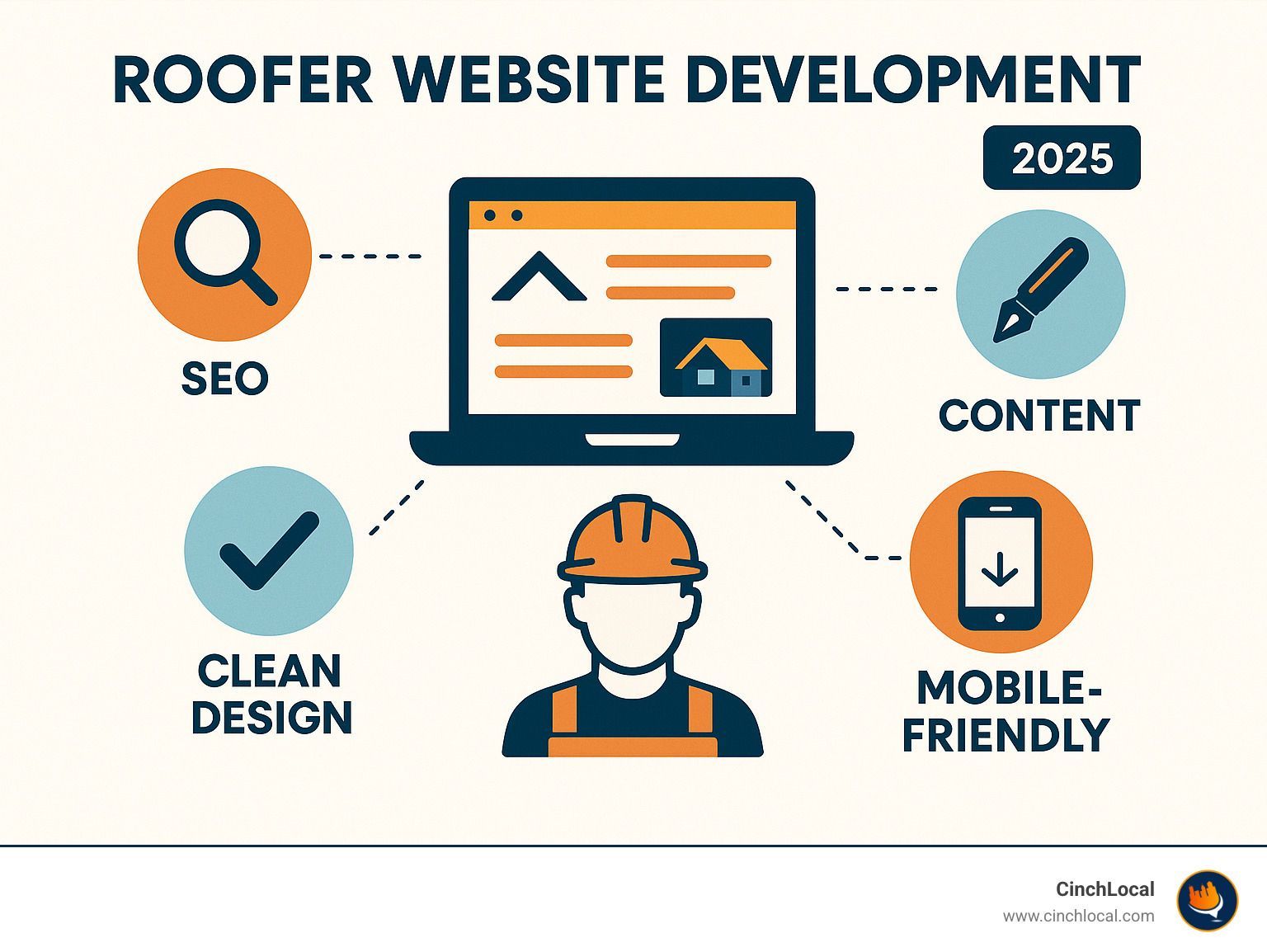
Why Professional Roofer Website Development Drives More Leads Than DIY Solutions
Roofer website development is the foundation that determines whether your roofing company gets found online or gets buried beneath competitors. Here's what you need to know:
Top Roofer Website Development Options: - Custom WordPress Development - $2,500-$10,000, 4-12 weeks timeline - Template-Based Builders - Wix ($16-39/month), Squarespace ($16-49/month), limited customization - All-in-One Marketing Systems - Integrated lead tracking, review management, local SEO - Local SEO-Focused Studios - Schema markup, city pages, Google My Business optimization
Essential Features That Generate Leads: - Mobile-responsive design (60% of traffic comes from mobile) - Click-to-call buttons and sticky contact forms - Project galleries with before/after photos - Fast loading times (under 3 seconds to prevent 50%+ visitor loss) - Local SEO optimization for Google Maps visibility
The research shows that 38% of visitors stop engaging if a website isn't visually appealing , while 48% believe a bad website means the company doesn't care about customers. With 60% of clients using search engines to find roofing businesses, your website becomes your most important sales tool.
I'm Cary Byrd, CEO of CinchLocal, and I've spent over a decade helping roofing contractors transform their online presence through strategic roofer website development and integrated marketing systems.
Quick look at roofer website development : - how to make a roofer website - roofer website design - roofing company website
What to Look for in a Roofer Website Development Partner
Finding the right roofer website development partner feels like searching for a needle in a haystack. The best development partners understand that your website isn't just a digital business card - it's your hardest-working salesperson.
Here's the thing about mobile responsiveness - it's not just nice to have anymore. With over 60% of your potential customers browsing on their phones, your site better work flawlessly on every device. I've watched contractors lose $50,000+ in annual revenue because their contact forms broke on mobile devices.
Local SEO expertise separates the pros from the pretenders. Your developer should get excited talking about schema markup, Google My Business integration, and city-specific landing pages. They need to understand that when someone searches "roof repair near me" at 2 AM during a storm, your website needs to be the first thing they see.
The Google E-E-A-T signals (Experience, Expertise, Authoritativeness, Trustworthiness) aren't just fancy acronyms - they're what separates your website from fly-by-night contractors. Your developer should know exactly how to showcase your licenses, insurance credentials, and customer testimonials in ways that make Google (and homeowners) trust you completely.
Conversion rate optimization should be baked into every page, not sprinkled on top like an afterthought. The right partner understands that roofing customers are often dealing with emergency situations or major investment decisions.
When reviewing portfolios, dig deeper than pretty pictures. Ask for real performance metrics - conversion rates, page load speeds, and search rankings. The best developers will proudly share case studies showing how their work generated actual leads and revenue for roofing contractors.
A clear roadmap and maintenance plan shows you're dealing with professionals, not amateurs. Creating helpful content is an ongoing process that requires consistent attention.
For inspiration on what great roofing websites look like, check out our comprehensive guide on roofing website design ideas to keep your business above the rest.
Red Flags That Cost You Leads
Slow loading times are the silent killer of roofing leads. If your website takes longer than 3 seconds to load, you'll lose over half your visitors before they even see your beautiful project gallery.
Template bloat is everywhere these days. Cookie-cutter websites not only make you look exactly like every other contractor, but they're often stuffed with unnecessary features that slow everything down.
Missing tracking and analytics leave you flying blind in a storm. You need to know which pages generate leads, where visitors abandon ship, and which marketing channels bring you the most qualified prospects.
Hidden fees are the ultimate red flag. Be suspicious when someone quotes you $2,000 for a website, then suddenly needs $500 extra for mobile optimization, another $200 for SSL, and $300 more for "basic SEO setup."
Top Approaches to Roofer Website Development
When it comes to roofer website development , you've got several paths to choose from - and picking the right one can make the difference between a website that generates leads and one that just sits there looking pretty.
Strategy tiers typically fall into four main categories, ranging from simple template customization all the way up to fully integrated marketing powerhouses. A brand-new contractor just getting started has completely different needs than an established company ready to dominate their local market.
WordPress continues to be the workhorse of the web, powering over 40% of all websites globally. For roofing contractors, this flexibility is crucial because your online needs will change as your business expands.
Website builders like Wix, Squarespace, and Webflow promise simplicity - and they deliver on that promise. But what seems perfect for getting started might feel limiting once you want to add advanced features like integrated CRM systems or sophisticated lead tracking.
Custom-coded solutions represent the premium end of the spectrum. Higher upfront investment? Absolutely. But the performance, uniqueness, and integration possibilities often justify the cost for established contractors.
Marketing bundles that combine website development with lead management, review automation, and performance tracking are becoming increasingly popular.
Custom WordPress Roofer Website Development Shops
WordPress development hits the sweet spot for most roofing contractors because it balances flexibility with affordability. Think of it as the reliable pickup truck of website platforms - it gets the job done, handles heavy loads, and keeps running year after year.
Clean, custom themes built specifically for roofing contractors outperform generic templates every single time. When a developer creates a theme from scratch for your roofing company, they're thinking about showcasing your project galleries, highlighting emergency services, and making those click-to-call buttons impossible to miss.
The plugin ecosystem is where WordPress really shines. Need a contact form that automatically sorts leads by service type? There's a plugin for that. Want to showcase before-and-after project photos in an interactive gallery? Covered.
Hosting costs for WordPress sites typically run $3-30 per month, depending on how much traffic you're getting. Many developers offer managed hosting that handles all the technical stuff so you can focus on roofing instead of website maintenance.
Scalability might be WordPress's greatest strength. You can start with a simple 5-page site and gradually add service area pages, blog content, customer portals, and advanced lead generation tools.
While WordPress.org Free provides the core platform, professional development, premium themes, and essential plugins typically cost $2,500-$10,000 for a complete roofing contractor website that actually generates leads.
Template-Based & Drag-and-Drop Roofer Website Development Packages
Template-based builders are like prefab buildings - they get you up and running quickly, but you're somewhat limited in how much you can customize them later.
Wix offers plans from free (with ads) up to $39/month for VIP features. Their construction-specific templates look decent, and the drag-and-drop editor means you can make changes without calling a developer every time.
Squarespace brings more design sophistication to the table, with plans running $16-49/month. Their templates often look more polished right out of the box, which matters when homeowners are comparing you to competitors.
Webflow bridges the gap between simple builders and custom development. At $12-36/month, it gives you more design control while keeping the visual editing interface.
The ease of use factor can't be overstated. You can literally build and launch a roofing website over a weekend, which beats waiting weeks for a custom developer to finish your project.
Local-SEO-Centric Roofer Website Development Studios
These specialized developers understand something crucial: roofing is fundamentally a local business. They build websites specifically designed to dominate Google Maps results and capture customers searching for roofers in your area.
Schema markup helps search engines understand your business better. When implemented correctly, it can make your listings show up with star ratings, phone numbers, and service areas right in the search results.
City-specific service pages target those valuable long-tail searches like "emergency roof repair in downtown Springfield." These pages help you capture highly motivated prospects who are searching for exactly what you offer in exactly the areas you serve.
Google My Business integration ensures your website and local listings tell the same story. The best developers sync everything automatically, so when you update your hours on your website, your Google listing updates too.
To improve your local ranking on Google , these specialists focus on factors like local content creation, customer review management, and geographic relevance signals.
All-in-one Roofer Website Development & Marketing Systems
These comprehensive platforms combine website development with lead tracking , review automation , and performance dashboards - basically everything you need to run your digital marketing from one central hub.
Lead tracking capabilities show you exactly which parts of your website generate phone calls, form submissions, and quote requests. Instead of guessing which marketing efforts work, you get hard data about what's driving your most profitable leads.
Review automation takes the awkwardness out of asking for testimonials. The system automatically requests feedback from completed projects and guides happy customers to leave reviews on Google.
Performance dashboards give you a bird's-eye view of how your online presence affects your bottom line. You can see which services generate the most interest, which pages need work, and how your Google Maps visibility translates into actual revenue.
At CinchLocal, our integrated system combines professional roofer website development with our proven "Roofer Footprint Expansion System" that guarantees increased Google Maps visibility and pre-sold leads within 30 days. Learn more about our complete roofing websites solution.
Essential Features That Separate High-Performing Roofing Websites
When homeowners need a new roof, they're often dealing with urgent repairs or making one of their biggest home investments. Your roofer website development needs to address these high-stakes situations with features that build trust instantly and make contacting you effortless.
Click-to-call buttons should be your website's best friend. When someone finds a leak at 10 PM or needs an emergency repair estimate, they want to talk to a real person, not fill out a form and wait for a callback. These buttons need to work flawlessly on mobile devices and be positioned where visitors can't miss them.
Your contact information shouldn't play hide and seek with visitors. Research shows that 44% of users abandon websites when they can't easily find contact information, which means nearly half your potential customers could slip away over something so simple to fix.
Project galleries tell your story better than any sales pitch ever could. Your real project photos, especially dramatic before-and-after shots, prove you can handle whatever roofing challenge walks through their door. When you geo-tag these images with location data, you're also giving Google extra signals about where you work.
Video testimonials carry emotional weight that written reviews simply can't match. When a satisfied customer looks into the camera and explains how you saved their home from water damage, it creates a connection that builds trust immediately. Keep these videos under two minutes.
Interactive shingle color tools address one of homeowners' biggest anxieties about roofing projects - "How will this look on my house?" These visualization tools keep visitors engaged while helping them envision their completed project.
Trust signals should be everywhere on your site. Your insurance credentials, manufacturer certifications, and Better Business Bureau ratings work best when they're woven into your content naturally rather than crammed into a "badges" section.
Site speed optimization might seem technical, but it directly impacts whether potential customers stick around long enough to learn about your services. Pages that load in under two seconds provide the best user experience, while anything over three seconds sends visitors straight to your competitors.

For more examples of effective roofing website features, explore our analysis of Roofing Websites Done Right: Examples from Industry Leaders.
SEO & Content Must-Haves for Roofer Website Development Success
The most beautiful roofing website in the world won't generate leads if nobody can find it. Technical SEO forms the foundation that makes everything else possible, and it needs to be baked into your roofer website development from day one.
Keyword mapping ensures every page on your site has a clear purpose and targets specific terms your customers actually search for. Your main service pages should target primary keywords like "roof repair [your city]," while more specific content can capture long-tail searches like "emergency roof leak repair near me."
Meta tags and descriptions serve double duty - they help search engines understand your content while acting as advertising copy in search results. These snippets are your first impression in search results, so they need to be compelling and accurate.
Header hierarchy is crucial for both search engines and real humans trying to steer your content. Your H1 tag should include your primary keyword and clearly state what the page offers.
Internal linking connects related pages and helps search engines understand how your content fits together. Link from your general roofing services page to specific project galleries, connect city-specific pages to relevant service descriptions.
A blog hub provides endless opportunities to target additional keywords while demonstrating your expertise. Regular content about maintenance tips, material guides, and seasonal preparation advice attracts traffic from informational searches.
For comprehensive SEO strategies custom specifically to roofing contractors, check out our Optimizing SEO for Roofing Businesses: Comprehensive Guide.
Interactive Elements That Boost Engagement
Static websites feel outdated in today's digital landscape. Interactive features keep visitors engaged longer, provide valuable insights into customer preferences, and create memorable experiences that differentiate your site from basic competitor pages.
Before-and-after sliders let customers see change results in a visually compelling way. These interactive comparisons work particularly well for roofing projects where the improvement might be subtle but significant.
Quote calculators and cost estimators provide immediate value while capturing lead information. Even basic tools that estimate project scope based on square footage and material choices can generate qualified leads from price-conscious customers.
Interactive project maps showing completed work in specific neighborhoods build local credibility and help customers visualize your presence in their area. When potential customers see that you've completed multiple projects on their street, it creates instant trust and social proof.
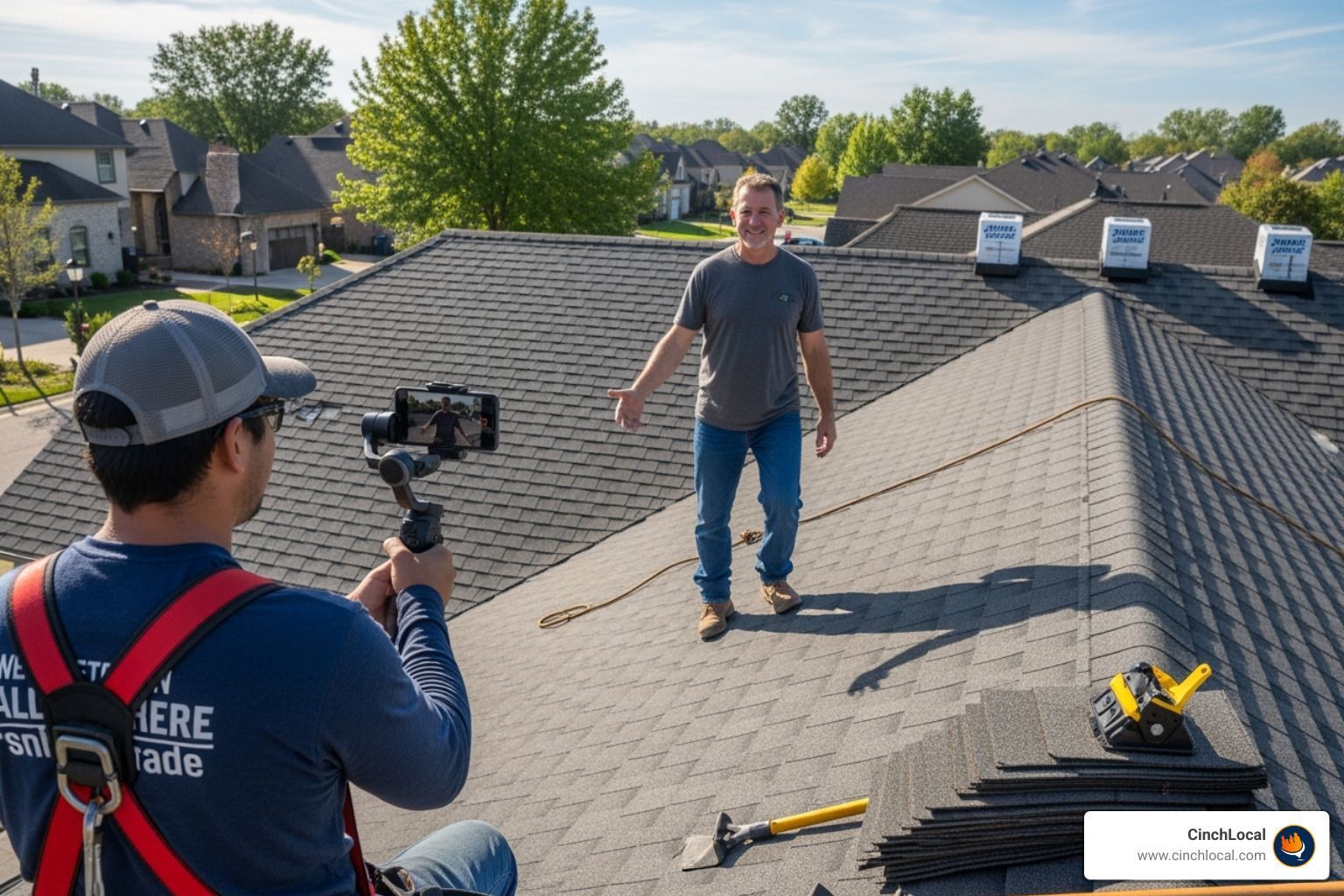
On-the-job video content embedded throughout your site provides authentic glimpses of your work process and team professionalism. These videos build trust while keeping visitors engaged longer than static content alone.
Comparing Costs, Timelines & Maintenance Packages
Let's talk numbers - because understanding the real cost of roofer website development means looking at the complete picture, not just that initial invoice.
Most professional roofing websites fall into the $2,500-$10,000 range for development, but the sticker price is just the beginning. That investment typically covers your custom design, mobile optimization, basic SEO foundation, and essential features like contact forms and project galleries.
SSL certificates run about $60 per year , though many hosting providers bundle these in now. Monthly hosting costs can surprise you if you're not prepared. Budget anywhere from $10-100 monthly depending on how much traffic you're getting and what performance level you need.
Update schedules are critical. WordPress sites need regular updates to stay secure and perform well. Core software, themes, and plugins all require ongoing maintenance. You can handle this yourself if you're tech-savvy, or invest in a managed maintenance plan.
ROI measurement is where the rubber meets the road. Track your organic traffic growth, lead generation improvements, and conversion rate increases. The best websites pay for themselves within 3-6 months through increased lead volume and better-qualified prospects.
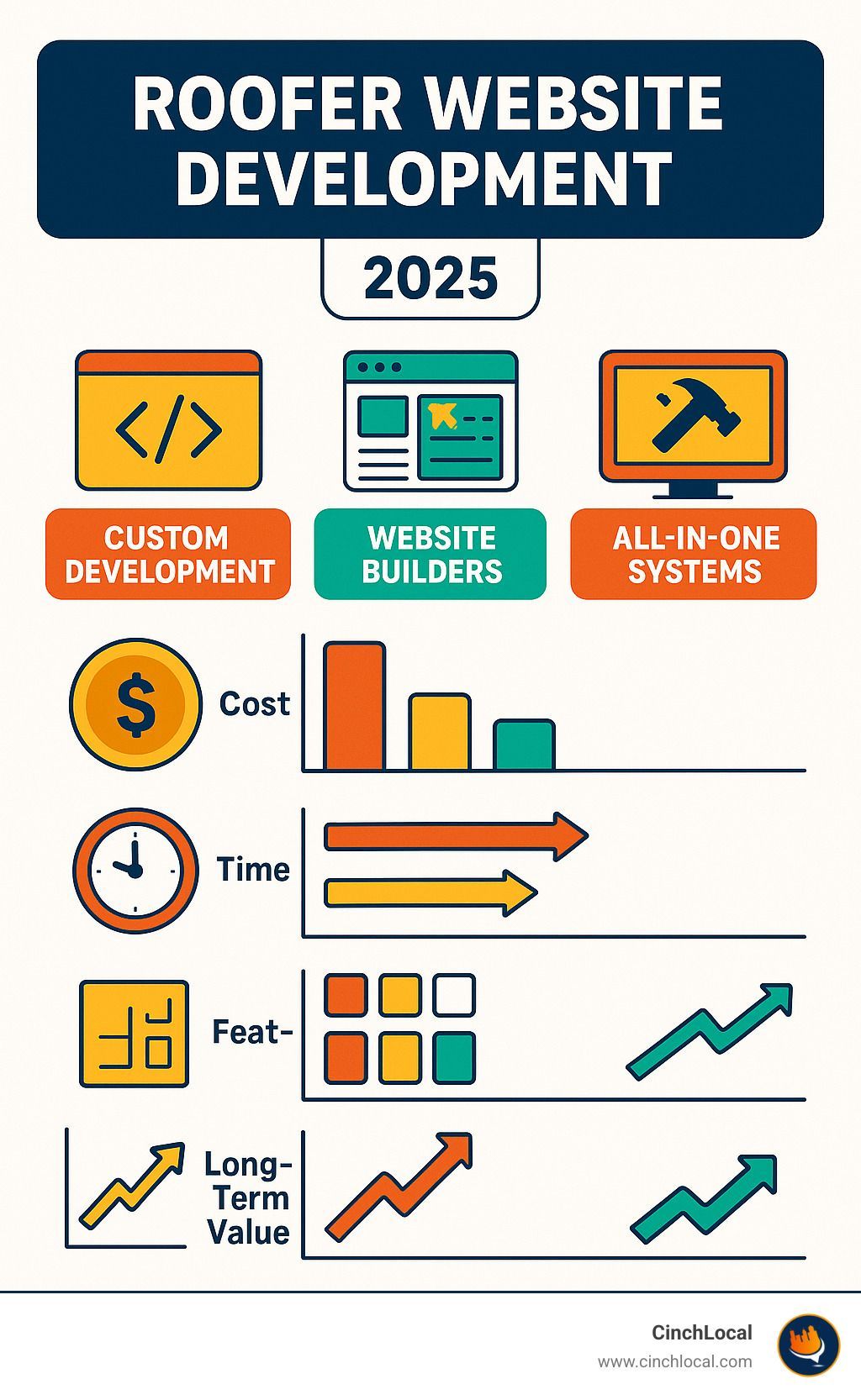
Timeline expectations vary dramatically based on your chosen approach. Template-based builders can get you online in 1-2 weeks, perfect if you need something yesterday. Custom WordPress development typically takes 4-8 weeks for a full-featured site that really showcases your work. All-in-one marketing systems usually need 2-4 weeks including all the integration setup.
The sweet spot for most roofing contractors? A custom WordPress site with integrated marketing tools that balances professional quality with reasonable timelines and costs. It's an investment that grows with your business rather than limiting it.
Frequently Asked Questions about Roofer Website Development
How long does roofer website development take?
The timeline for roofer website development really depends on what you're trying to build. If you're going with a simple template-based solution, you could be online in just 1-2 weeks. But if you want something custom-built with all the bells and whistles, you're looking at more like 4-8 weeks.
Here's how most projects break down: strategy and planning takes about a week, design mockups and approval usually runs 2-3 weeks, development and coding is typically 3-4 weeks, content creation and optimization takes 1-2 weeks, and finally testing and launch wraps up in about a week.
Several factors can stretch these timelines. Custom functionality like interactive quote calculators or CRM integrations take extra time. If you need extensive content written from scratch, that adds weeks. And revision cycles can slow things down if we're going back and forth on design changes.
I always tell contractors not to rush the process. We can throw together a basic site quickly, but proper SEO optimization, quality content creation, and thorough testing take time. It's way better to invest in doing it right the first time than dealing with expensive fixes down the road.
What ongoing maintenance is required?
Think of website maintenance like maintaining your truck - ignore it, and you'll end up broken down at the worst possible moment. Your website needs regular attention to stay secure, fast, and effective at generating leads.
Security updates are the most critical part. WordPress core, themes, and plugins get updated regularly to patch security vulnerabilities. These should be applied monthly at minimum, though critical security patches need immediate attention.
Content updates keep your site fresh and interesting to both visitors and search engines. Add new project photos regularly - nothing builds trust like showing off your latest work. Update service descriptions seasonally. Publishing blog content about roofing tips or industry updates maintains search engine interest.
Backup systems are your insurance policy against disasters. Server crashes, security breaches, or even simple human error can destroy months of work. Daily automated backups stored off-site mean you can recover quickly from almost any problem.
Performance monitoring catches issues before your customers notice them. Regular speed tests ensure your site loads quickly. Broken link checks prevent the frustration of dead-end pages. Mobile compatibility reviews make sure your site works perfectly on smartphones and tablets.
How important is Google My Business integration?
Google My Business integration isn't just important for roofing contractors - it's absolutely essential. Most of your qualified leads start with local searches, and your website needs to work hand-in-hand with your GMB profile to capture those opportunities.
Map pack visibility is where the magic happens. Those top 3 local results that show up with the map? That's prime real estate for roofing contractors. When your website SEO and GMB optimization work together properly, you have a much better shot at landing in those coveted spots where customers actually click.
Consistent information across your website and GMB profile builds trust with both customers and Google's algorithms. Your business name, address, and phone number need to match exactly everywhere they appear. Inconsistent information confuses search engines and can hurt your local rankings significantly.
Review integration creates a powerful feedback loop. Display your Google reviews prominently on your website to build credibility with visitors. At the same time, use your website to encourage satisfied customers to leave reviews on Google.
The bottom line? Your website and Google My Business profile are like a tag team - they're much more effective working together than either one alone. For roofing contractors serious about dominating local search, proper integration between these platforms is non-negotiable.
If you want to dive deeper into maximizing your local search presence, check out our Google Maps Local SEO for Roofers service page for more detailed strategies.
Conclusion & Next Steps
The journey of roofer website development doesn't end when your site goes live - it's really just the beginning. Think of your website as a digital storefront that needs the same attention and care you'd give to a physical location. The difference is, this storefront never closes and can reach customers while you're up on a roof or meeting with clients.
The roofing industry moves fast, and so does the digital world. What worked for websites five years ago won't cut it today. That's why future-proof development matters more than saving a few dollars upfront.
Data-driven decisions separate contractors who thrive from those who struggle with feast-or-famine cycles. Your website should tell you exactly which pages convert visitors into leads, which services generate the most interest, and where potential customers drop off. Without this information, you're essentially flying blind in your marketing efforts.
The right development partner becomes an extension of your team, not just a vendor who disappears after launch. They should understand that emergency roof repairs spike during storm season, that homeowners research extensively before choosing contractors, and that local reputation makes or breaks roofing businesses.
Here's what we've learned after helping hundreds of roofing contractors transform their online presence: generic solutions produce generic results . The roofing industry has unique challenges, customer behaviors, and market dynamics that require specialized expertise.
At CinchLocal, we've built our entire business around one focus - helping roofing contractors dominate their local markets. Our Roofer Footprint Expansion System isn't just website development; it's a comprehensive approach that combines professional web design with proven local SEO strategies and automated lead generation.
What makes our approach different? We guarantee results because we understand what works specifically for roofing contractors. Within 30 days, you'll see increased Google Maps visibility and start receiving pre-sold leads from customers who've already researched your services and are ready to buy.
Our integrated system handles everything from custom website design optimized for roofing conversions to Google Maps optimization that puts you ahead of competitors in local searches. We also build in review management systems that automatically request feedback from satisfied customers and performance tracking that shows exactly how your investment translates into leads and revenue.
The contractors we work with across Ohio, Tennessee, Georgia, and California don't just get websites - they get complete digital marketing systems that grow their businesses predictably and sustainably.
Your competitors are already investing in professional roofer website development . The real question isn't whether you can afford to build a high-performing website - it's whether you can afford to keep losing leads to contractors who've made this investment.
Ready to stop competing on price and start attracting customers who value quality? Visit our Roofing Websites service page to see how we help roofing contractors build websites that actually generate leads, or contact us today to discuss your specific goals and challenges.
The next storm season is coming. Make sure your digital presence is ready to capture every opportunity.
Want Us to Uncover Hidden 'Footprint Gaps' And Critical Blind Spots That’s Quietly Draining Calls, Jobs, and Profits?
Simply Fill Out The Form Below:



